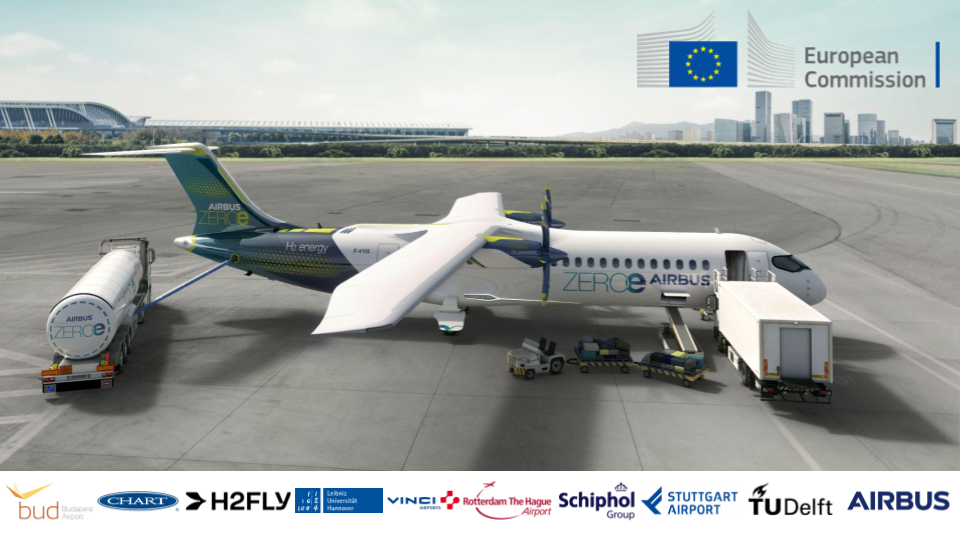Innovative aviation liquid hydrogen project launched
TU Delft is one of the academic partners in an innovative aviation hydrogen handling and refuelling project, led by Airbus and supported by academic partners, airport operators and leading hydrogen-industry companies that was launched on 16 May in Brussels. The project, co-funded by the European Union, has been launched to demonstrate small-scale liquid hydrogen aircraft ground operations at three European airports, including Rotterdam The Hague Airport.
The urge to decarbonise our economy and to develop Europe’s energy independence is leading to a major trend of hydrogen for mobility and stationary applications. Hydrogen will also be a solution to decarbonise short- and medium-haul aviation and will be crucial for the advancement of low-carbon aviation operations.
The GOLIAT (Ground Operations of LIquid hydrogen AircrafT) project* will receive funding of €10.8 million from the EU’s Horizon Europe Framework Programme, over a duration of four years, and will demonstrate how high-flow liquid hydrogen (LH2) handling and refuelling technologies can be developed and used safely and reliably for airport operations.
The GOLIAT consortium consists of 10 partners from eight countries: Airbus (France, Germany, UK), Chart Industries (Czech Republic, Italy), TU Delft (Netherlands), Leibniz University Hannover (Germany), Royal Schiphol Group (Netherlands), Rotterdam The Hague Airport (Netherlands), Vinci Airports (France, Portugal), Stuttgart Airport (Germany), H2FLY (Germany), and Budapest Airport (Hungary).
The group will support the aviation industry’s adoption of LH2 transportation and energy storage solutions by:
- Developing and demonstrating LH2 refuelling technologies scaled-up for future large commercial aircraft;
- Demonstrating small-scale LH2 aircraft ground operations at airports;
- Developing the standardisation and certification framework for future LH2 operations;
- Assessing the sizing and economics of the hydrogen value chains for airports.
As a clean and efficient fuel, LH2 offers a promising solution for reducing the greenhouse gas emissions associated with airport operations and their dependence on fossil fuels. LH2’s high energy density enables long-range travel for aircraft, yet there are many steps to the widespread deployment of hydrogen at airports, including the need to better understand the operational, regulatory, economic and safety impacts, as well as the capacity and performance of technologies.
We are very delighted to be a partner of the GOLIAT project and to host one of the demonstrations at Rotterdam The Hague Airport. As part of the Royal Schiphol Group, we strongly believe that hydrogen, alongside sustainable aviation fuels and electric flight, is one of the potential energy carriers to decarbonize aviation. However, there are many challenges that need to be addressed on multiple fronts in order to fully realize the potential of hydrogen aviation, including refuelling of hydrogen aircraft. As a regional airport, we're at the forefront of hydrogen aviation initiatives, with multiple projects underway in collaboration with various partners in our region. The GOLIAT project aligns seamlessly with our hydrogen roadmap, serving as a crucial step towards the preparation and integration of hydrogen aviation within our airport environment.
Wilma van Dijk, CEO Rotterdam The Hague Airport
At Delft University of Technology, we are researching various aspects of hydrogen-powered aviation since this energy carrier shows great potential to reduce aviation’s climate impact. To facilitate this transition, we should develop suitable airport infrastructure and operations. As a partner in the GOLIAT project, we look forward to creating operational concepts and computational models for airport ground operations of hydrogen-powered aircraft, considering the airline’s perspective. This way, we can help airports and airlines prepare for future hydrogen aircraft and contribute to a more sustainable aviation ecosystem.
Alexei Sharpanskykh, Elise Bavelaar, and Pieter-Jan Proesmans, Faculty of Aerospace Engineering, TU Delft
Hydrogen is a high-potential technology with a specific energy-per-unit mass that is three times higher than traditional jet fuel. If generated from renewable energy through electrolysis, hydrogen emits no CO2 emissions, thereby enabling renewable energy to potentially power large aircraft over long distances without the undesirable by-product of CO2 emissions.
Because hydrogen has a lower volumetric energy density, the visual appearance of future aircraft will likely change to better accommodate hydrogen storage solutions that will be bulkier than existing jet fuel storage tanks.
Hydrogen has been safely used in the aerospace and automobile industries for decades. The aviation industry’s challenge is to adapt this decarbonised energy carrier to commercial aviation’s needs.
There are two primary uses for hydrogen:
Hydrogen propulsion: Hydrogen can be combusted through modified gas-turbine engines or converted into electrical power that complements the gas turbine via fuel cells. The combination of both creates a highly efficient hybrid-electric propulsion chain powered entirely by hydrogen.
Synthetic fuels: Hydrogen can be used to create e-fuels, which are generated exclusively through renewable energy.
Read the full press release with quotes from and information about all partners on the GOLIAT project card and follow project updates on the GOLIAT LinkedIn page.
Media contact at TU Delft:
Ineke Boneschansker, 06 140 151 19, i.boneschansker@tudelft.nl.
